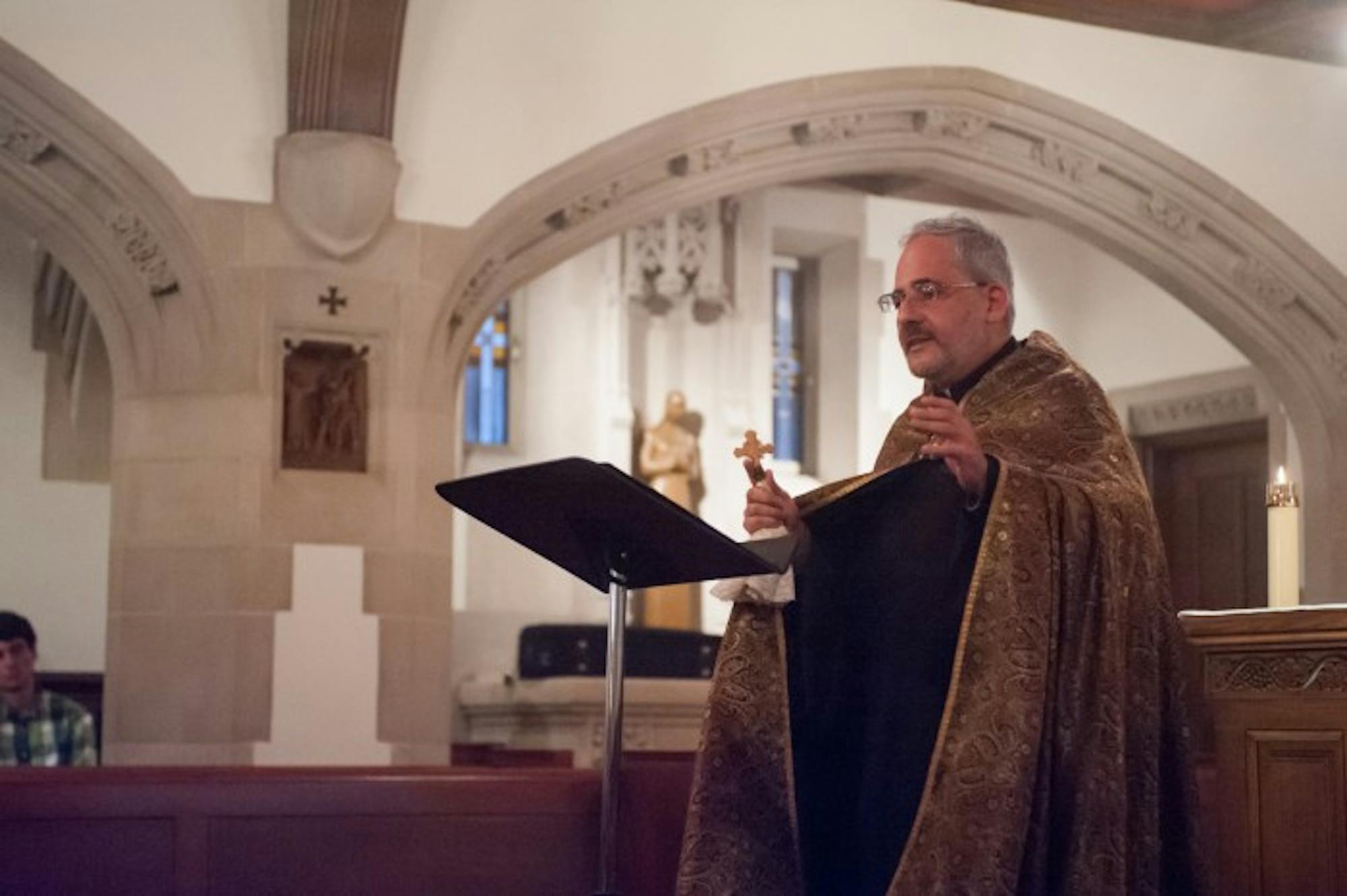“For I am sure that neither death nor life, nor angels nor principalities, nor things present nor things to come, nor powers, nor height nor depth, nor anything else in all creation, will be able to separate us from the love of God in Christ Jesus our Lord.”
These words, from Paul’s letter to the Romans, echoed throughout the Alumni Hall chapel Wednesday night as Notre Dame hosted a candlelight vigil to remember the victims of the 1915 Armenian genocide.
One hundred years ago, the Ottoman Turks “orchestrated mass pogroms, persecutions and death marches resulting in the annihilation of 1.5 million ethnic Armenians,” according to the Nanovic Institute website.
Armenian priest Der Hovhan led the service commemorating the genocide’s centennial.
“I have always been amazed at how fast life can change,” Hovhan said as he began his homily. “Things are one way one day, and the next day they are totally different. One day you think you are well, the next day you discover that you are extremely ill. One day your life is going well, the next day everything has fallen apart. One day it appears that there is no hope in your situation, the next day your problem has been solved. It is true that many changes can occur over one day. What a difference a day makes.
“What a difference a day makes. April 24, 1915,” he said. “It was the fourth Sunday of Easter, known in the Armenian Church calendar as Red Sunday. It was the day of the beginning of the Armenian genocide. On that night, 300 Armenian leaders, writers, thinkers and professionals in Constantinople, present day Istanbul, were collected, deported and killed. Five thousand of the poorest Armenians were also slaughtered in their homes and the streets.
“It was the beginning,” he said. “Over the course of the next years, out of the 2 million total Armenians, one and a half million were killed. Thousands were deported, hundreds of churches, monasteries and schools were closed, 4,000 clergymen were killed. Yes — Ottoman Turks committed the genocide in order to overpower us, the Armenians — to destroy us, if possible.”
And yet, despite these efforts, the genocide failed, Hovhan said. Armenians have rebuilt their lives and rebuilt their identity as a people.
“The Armenian spirit showed that it could not be overpowered,” Hovhan said. “It would be more accurate to say that God showed, through the example of the Armenian people, that the spirit borne, nourished and livened with centuries of existence as distinctly Christian people could not be subjugated.”
This strength was deep within every Armenian that had endured the genocide, Hovhan said.
“From my childhood, I remember my great-grandfather … he had a large family, and all of his children and his wife were slaughtered in 1915 in front of his eyes,” he said. “I cannot imagine anything worse in my life to happen to me.”
But despite this tragedy, Hovhan said his great-grandfather was “a living monument” to the Armenian people’s victory over death and suffering.
“When I think about [my grandfather], when I think about him now, what happened to him, I realized he lived the Gospel,” Hovhan said. “He was a living gospel. He was dead in 1915, I’m sure he was dead. He was breathing, he was moving but he was dead after all he saw. But he was reborn. He had overcome the world. His new life was a victory over his death.”
And just as his great-grandfather was reborn, Hovhan said the Armenian people are being reborn, as well. Today, the Armenian Apostolic Church will canonize the victims of the genocide as saints. The “greater reality” of the genocide will no longer be one of death and suffering, Hovhan said, but one of victims’ “defiance of death in the name of taking up the cross of death in Jesus Christ.”
“We all know the events that precede the Sunday of Resurrection,” Hovhan said.
“A couple weeks ago, during the Holy Week, we, as a Church, remember[ed] every step Jesus took during his last hours on this earth. We remember[ed] his betrayal on Holy Thursday, his crucifixion on Holy Friday. And on Sunday, we announce[d] that Christ is risen from the dead.
“Our nation too, went through all these steps,” he said. “We were betrayed, we were crucified and buried, and for the last 99 years, joining the oil-bearing women, we were coming to the empty tomb, trying to see dead bodies.
“And finally, today, 100 years later, we realize that the tomb is empty. The victims are not in that tomb. My brothers and sisters, I’m here today to announce that today is the Easter eve of the Armenian nation. Because tomorrow, in a few hours, our martyrs will be canonized, and the victims will become victors. It is indeed the Easter of the Armenian nation.
“What a difference a day makes.”
News writer Rachel O'Grady contributed to this report.
ND remembers the 100th anniversary of the Armenian Genocide
Rosie LoVoi
Rosie LoVoi









